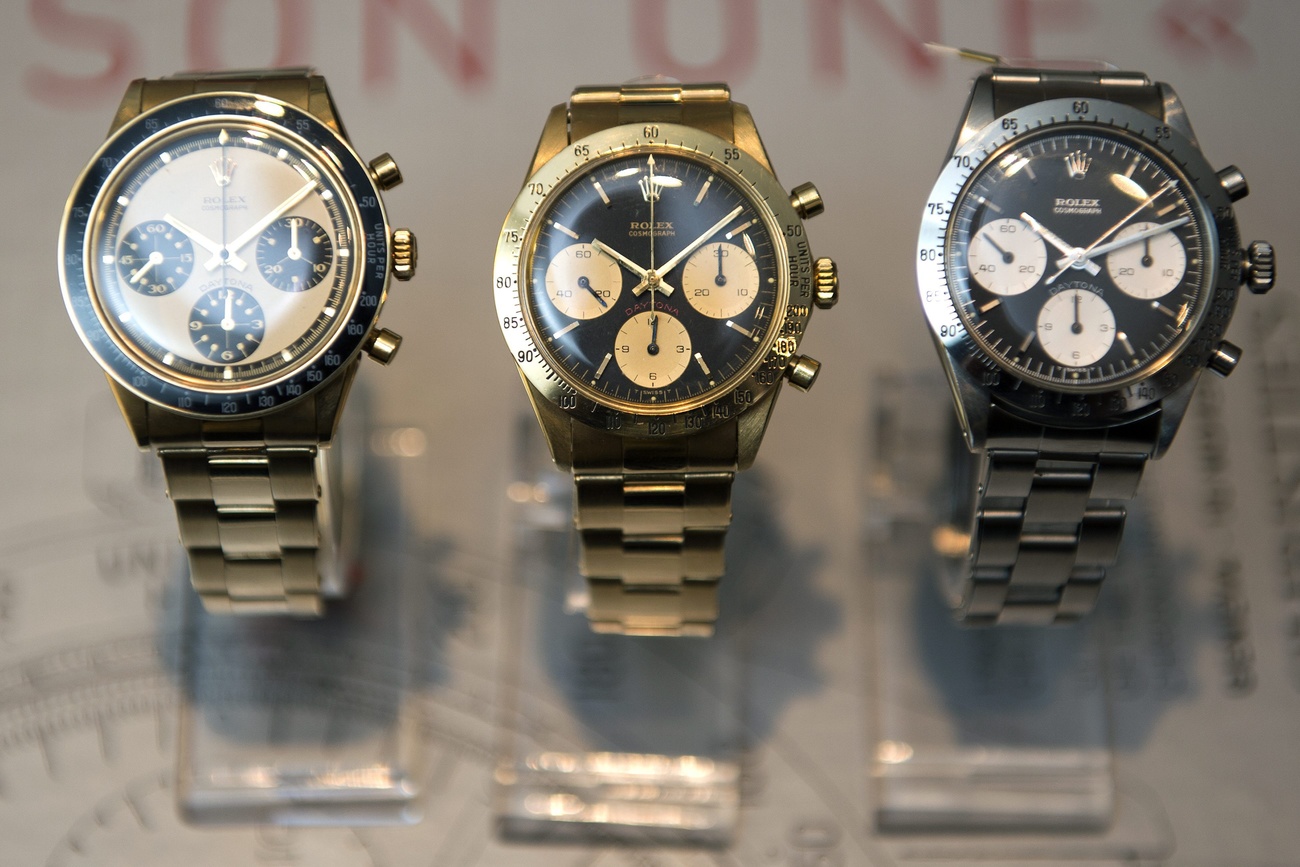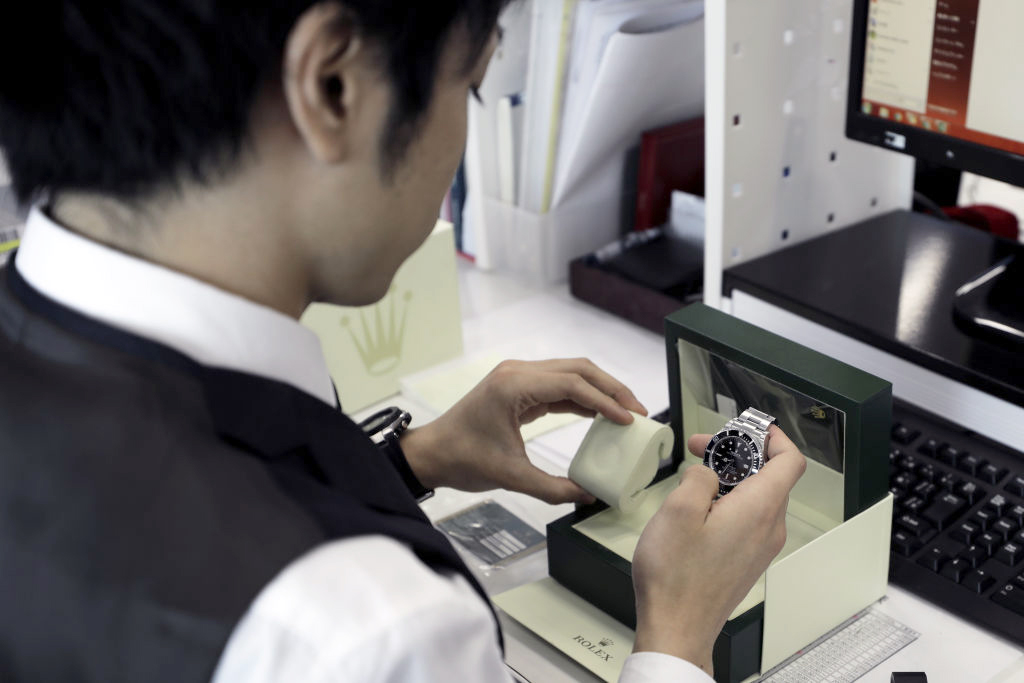Why watch sharing doesn’t work – even in Switzerland

Hundreds of Swiss luxury watches entrusted to a watch-sharing platform have been stolen in a case of fraud in Japan. A similar service has ceased operations in Switzerland. Is such a business model feasible, or is it fundamentally flawed?
Toke Match, a luxury watch-sharing service in Japan, ceased operations at the end of January after customers failed to get their deposited watches back. The total value of the missing watches, around 90% of which are Swiss luxury watches, amounts to around 1.9 billion yen (CHF11 million).

More
Hundreds of Swiss luxury watches disappear in Japan
In Switzerland, the home of luxury watches, there was also a sharing service that allowed individuals to rent and hire out watches. Launched in August 2019, DIALS borrowed watches with a market value of CHF4,000 ($4,400) or more from their owners and rented them out for three weeks, three months or six months. The rental costs started at CHF150 a month, of which the owner received 40%.
“Why buy things when you can share them? This also applies to luxury goods,” Robin Vogelsang, one of the company founders, explained his business idea to the media.
Someone who rented a Breitling from DIALS told Tele Züri: “I have watches that are more expensive, but it’s important for me to have variety. I don’t want to wear the same watch for 20 or 30 years.”
The DIALS business model was similar to Toke Match. But even if there were no fraudulent intentions behind it, problems arose and the service was cancelled. “The sharing model was no longer sustainable in the long term,” co-founder Julian Vogelsang told SWI swissinfo.ch. Although customers had to undergo a strict onboarding process, there were always people who did not return the rented watches and could not be identified.
Criminal proceedings had to be initiated against the fraudsters, which led to high legal costs. Insurance premiums also increased. By passing on these costs, rental prices rose to an unattractive level for customers. In order to keep insurance premiums at a profitable level, many watches would have had to be rented out. But the number of prospective renters was too low. The founders discontinued the service in January 2023.
“The concept was very exciting and was very well received. However, you have to find a way to identify the fraudsters in advance,” said Julian Vogelsang.

Special commodity
Sharly, the largest goods-sharing platform in Switzerland, also does not offer luxury watches for hire. Chief operating officer Ivo Kuhn told SWI swissinfo.ch that “it would be too time-consuming for the manufacturers to clean the watches after they are returned”. They would therefore not rent them out.
In general, the sharing of items is not as widespread in Switzerland as in the property and transport sectors. According to the Sharing Monitor Switzerland by Lucerne University of Applied Sciences and Arts, awareness of goods sharing is at 30%, significantly lower than temporary home sharing at 87% and car sharing at 93%. Only 3% of respondents have experience with goods sharing.
“We observe that sharing customers are often particularly careful with the rented items. In other cases, however, we see exactly the opposite,” economics professor Dominik Georgi, who heads the Sharing Monitor, told SWI swissinfo.ch.
There is also a large secondary market for luxury watches. Popular models such as Rolex watches are so hard to come by that their resale prices often exceed the new prices, which makes them targets for criminal offences such as fraud, theft and robbery.

More
Watch lovers in Japan can spend years hunting for a Rolex
Watch theft is a global problem
Georgi believes that, in theory, a sharing service for watches could also be established. “Many people would like to wear a luxury watch at least once but are unable to purchase one due to a lack of financial resources or a shortage of funds. On the other hand, there are many owners who have several watches and don’t need to have them all to hand.”
But how can renter fraud be prevented? “The rating function on the platform can help and the recommendation is to rent only to users with the highest ratings,” Georgi says. In the future, blockchain technology should also help to prevent theft.

More
How are you? What is on your mind? Take part in our big survey
A certification system from a third-party organisation can also be helpful in keeping out malicious intermediaries. The fact that Toke Match had been certified by the Sharing Economy Association, an industry organisation in Japan, gave owners peace of mind. According to the Japanese newspaper Nikkei, the organisation has started to review its auditing system following the Toke Match case. Proposals are now being made to require additional financial reports for the lending of high-quality goods and to check the credibility of business owners.
In any case, the problem is a global one: according to Watch Register, a UK company that helps owners, auction houses and dealers identify stolen watches, the number of watches registered as stolen or lost in 2023 more than tripled compared to the previous year. A total of 100,000 watches worth £1.5 billion (CHF1.7 billion) were registered in 2023.
Edited by Reto Gysi von Wartburg/sj. Adapted from German by DeepL/ts

More
Newsletters

In compliance with the JTI standards
More: SWI swissinfo.ch certified by the Journalism Trust Initiative











You can find an overview of ongoing debates with our journalists here . Please join us!
If you want to start a conversation about a topic raised in this article or want to report factual errors, email us at english@swissinfo.ch.